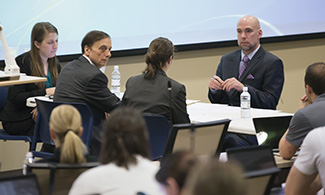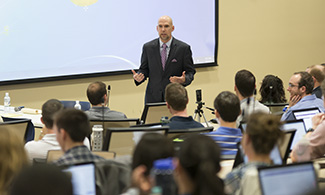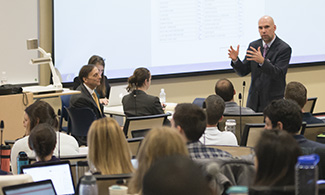Monday, February 13, 2017
LUCOM and Liberty Law team up for malpractice deposition exercise
Mon, 13 Feb 2017Christopher Breedlove | Director of Marketing, PR, and Web-Operations

Liberty University College of Osteopathic Medicine (LUCOM) and Liberty University School of Law (LUSOL) staged a deposition exercise earlier this month inside the Center for Medical and Health Sciences. The exercise is a new component to LUCOM’s course, Humanities and Medical Jurisprudence, designed to introduce student-doctors to issues of diversity, culture, professionalism, ethics, law, and regulations affecting medical licensure and practice. The exercise illustrated the importance of learning a patient’s history and the potential risk of negligence.
The statement of the case showed that the plaintiff sued a family physician for failing to warn her deceased husband about the potentially dangerous interaction of certain medications he was taking. The wife of the deceased sued for medical malpractice. The exercise demonstrated how lawyers ascertain what the physician knew or should have known concerning a known drug interaction.
 School of Law Senior Instructor of Lawyering Skills Grant M. Rost, J.D., served as lead counsel, with LUCOM student-doctor Bridget Dillon, OMS-II, acting as the doctor at fault. “Litigation can be scary for anyone who participates in it, even those just serving as a witness. As these future doctors, could very likely have to serve as a witness one day, my hope is that this deposition simulation pulls back the curtain on what testifying about your expertise usually entails,” said Rost. “If we understand the process, we can be a little less afraid going in.”
School of Law Senior Instructor of Lawyering Skills Grant M. Rost, J.D., served as lead counsel, with LUCOM student-doctor Bridget Dillon, OMS-II, acting as the doctor at fault. “Litigation can be scary for anyone who participates in it, even those just serving as a witness. As these future doctors, could very likely have to serve as a witness one day, my hope is that this deposition simulation pulls back the curtain on what testifying about your expertise usually entails,” said Rost. “If we understand the process, we can be a little less afraid going in.”
According to Dillon, the exercise gave her and her classmates the opportunity to see exactly what a deposition entails. “In retrospect you think it’s [deposition] about everything we know and how we practice medicine, but the reality of it is, because lawyers think differently, it causes us to think about what we might not know.”
 Robert B. Vogel, MD, J.D., practicing attorney with Overbey, Hawkins and Wright and retina specialist with Piedmont Eye Center, sat at the deposition table to serve as defense for the defendant. According to Vogel, this exercise helps foster a mutual understanding and respect between two professions that often perceive themselves to be at odds. “It is valuable for doctors in training to understand the legal process with respect to medical malpractice cases. Statistically, many of them will be called upon to testify at some point in their careers.” Vogel is a graduate of Liberty’s School of Law and guest lectures at LUCOM as a content expert.
Robert B. Vogel, MD, J.D., practicing attorney with Overbey, Hawkins and Wright and retina specialist with Piedmont Eye Center, sat at the deposition table to serve as defense for the defendant. According to Vogel, this exercise helps foster a mutual understanding and respect between two professions that often perceive themselves to be at odds. “It is valuable for doctors in training to understand the legal process with respect to medical malpractice cases. Statistically, many of them will be called upon to testify at some point in their careers.” Vogel is a graduate of Liberty’s School of Law and guest lectures at LUCOM as a content expert.
Liberty Law students also joined the student-doctors in the audience as part of their education, observing and learning the process of a malpractice deposition. Even though the exercise was brief, lasting two hours, it gave an opportunity for students to see the legal perspective, how to ask specific questions to a practicing physician, and hear the kinds of questions physicians should be aware of and how they might respond.
School of Law Associate Dean for Academic Affairs, Timothy M. Todd, J.D., watched and enjoyed both professions interacting in this context. “At Liberty, a world-class university, it offers opportunities for our professional schools, the law school and medical school, to collaborate. There’s a really rich intersection of law and medicine, and I think this deposition event really demonstrates how we can come together on campus. I look forward to more collaborations between these schools.”
David F. Klink, DO, interim dean at LUCOM, said, “It is a significant advantage for our students to have the opportunity to interact with and learn from faculty and students from other professional schools and health education programs at Liberty University. As the University continues to expand its programs in health sciences, engineering, and other fields, these opportunities will continue to expand”.
 At the end of the exercise, Prof. Rost concluded by answering questions from the students as well as gave an encouraging plea for student-doctors to be a part of the law school’s trial advocacy courses. “There is a mutual benefit for law students and medical students to work together here at Liberty. We need you,” concluded Rost.
At the end of the exercise, Prof. Rost concluded by answering questions from the students as well as gave an encouraging plea for student-doctors to be a part of the law school’s trial advocacy courses. “There is a mutual benefit for law students and medical students to work together here at Liberty. We need you,” concluded Rost.
Watch the WDBJ7 segment.